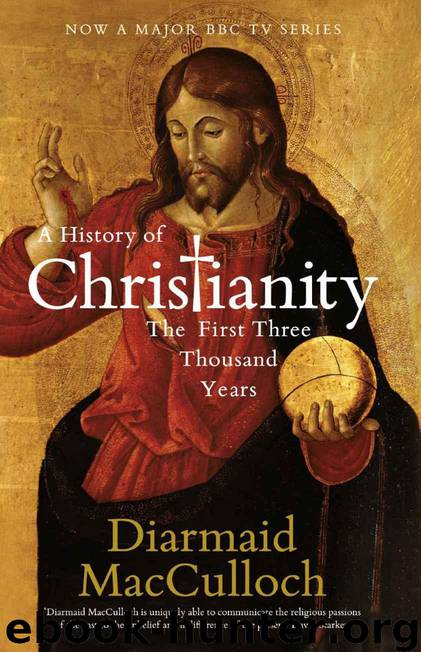A History of Christianity: The First Three Thousand Years by Diarmaid MacCulloch

Author:Diarmaid MacCulloch
Language: eng
Format: mobi
ISBN: 9780141957951
Publisher: Penguin Books Ltd
Published: 2009-09-23T23:00:00+00:00
STRASSBURG, ENGLAND AND GENEVA (1540–60)
One of the most apparently promising solutions to the relationship of Church and temporal power in the first three decades of the Reformation was developed in the city-state of Strasbourg (then the overwhelmingly German-speaking Strassburg), led by a former Dominican friar, Martin Bucer. Until the middle of the century, it looked as if Strassburg would become the centre of the future Reformation, for Bucer was a self-proclaimed (though fatally verbose) broker of consensus amid the Reformers’ disagreements, and the city lay at the heart of European trade and culture. It attracted a good many radical enthusiasts, but thanks to Bucer’s unwearying powers of argument and obvious concern for the purity of the Church, it was rather better at persuading radicals back into the mainstream than most Protestant states and generally more humane in its reaction to them.36 Nevertheless, Strassburg was soon to fall away from European leadership because of military defeat, and then there would be other contenders: first England, followed by Geneva.
Prospects for a civilized religious settlement and the reunion of the Western Church were high around 1541–2, but they ended in disappointment. This was the time when Hermann von Wied, Archbishop of Cologne, the only prince-bishop in Germany to try meeting the Reformation halfway, was attempting to lead his archdiocese in a Reformation whose planning involved not just his own clergy but also Martin Bucer. In the next few years, however, he failed, defeated by fierce opposition from traditionalists in his own Cathedral Chapter and by firm intervention from Charles V which eventually saw him ejected from his see. If von Wied’s plans had worked, Cologne might have been an example to other Catholic prelates of how to find a middle path of change within the old structures.37 With the failure of discussions between Protestants and Catholics around the imperial Diet at Regensburg in 1541 (see pp. 662–3), the time for humanist moderation was evidently past; against this background, in 1545 a council of the Western Church convened by the Pope at last began meeting at Trent, in a mood of aggressive confidence, to take new initiatives in the papal Church. By the late 1540s, it looked as if the Reformation’s opponents were triumphing. Luther died in 1546, by which point Zwingli was long dead. The Holy Roman Emperor confronted the military alliance formed by his Lutheran princes, the ‘Schmalkaldic League’, and in 1547 roundly defeated them (see Plate 55): as part of his victory, he ended the independent career of the Reformation in Strassburg, which had with uncharacteristic rashness committed itself to the Schmalkaldic alliance.38
Martin Bucer hastily left Strassburg for England, where the group of politicians ruling in the name of Henry VIII’s young son, Edward VI, after Henry’s death in 1547 now had the chance to propel England into the leadership of the Reformation throughout Europe. Archbishop Cranmer, one of their number and now a hardened political operator, led a thoroughgoing destruction of the traditional devotional world in England. His Reformation owed
Download
This site does not store any files on its server. We only index and link to content provided by other sites. Please contact the content providers to delete copyright contents if any and email us, we'll remove relevant links or contents immediately.
| Buddhism | Christianity |
| Ethnic & Tribal | General |
| Hinduism | Islam |
| Judaism | New Age, Mythology & Occult |
| Religion, Politics & State |
Cecilia; Or, Memoirs of an Heiress — Volume 1 by Fanny Burney(31355)
Cecilia; Or, Memoirs of an Heiress — Volume 3 by Fanny Burney(30952)
Cecilia; Or, Memoirs of an Heiress — Volume 2 by Fanny Burney(30909)
The Secret History by Donna Tartt(16676)
Sapiens: A Brief History of Humankind by Yuval Noah Harari(13086)
Leonardo da Vinci by Walter Isaacson(11927)
The Radium Girls by Kate Moore(10924)
Sapiens by Yuval Noah Harari(4560)
The Wind in My Hair by Masih Alinejad(4430)
How Democracies Die by Steven Levitsky & Daniel Ziblatt(4427)
Homo Deus: A Brief History of Tomorrow by Yuval Noah Harari(4293)
Endurance: Shackleton's Incredible Voyage by Alfred Lansing(3857)
The Silk Roads by Peter Frankopan(3794)
Man's Search for Meaning by Viktor Frankl(3656)
Millionaire: The Philanderer, Gambler, and Duelist Who Invented Modern Finance by Janet Gleeson(3577)
The Rape of Nanking by Iris Chang(3530)
Hitler in Los Angeles by Steven J. Ross(3450)
The Motorcycle Diaries by Ernesto Che Guevara(3348)
Joan of Arc by Mary Gordon(3272)
